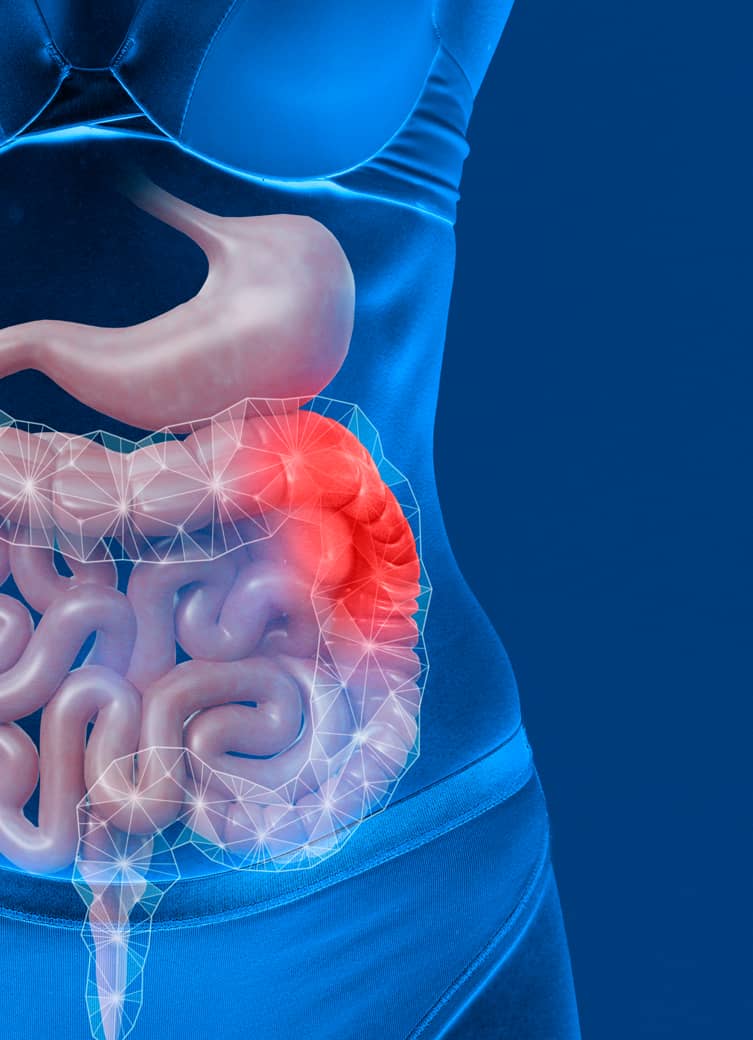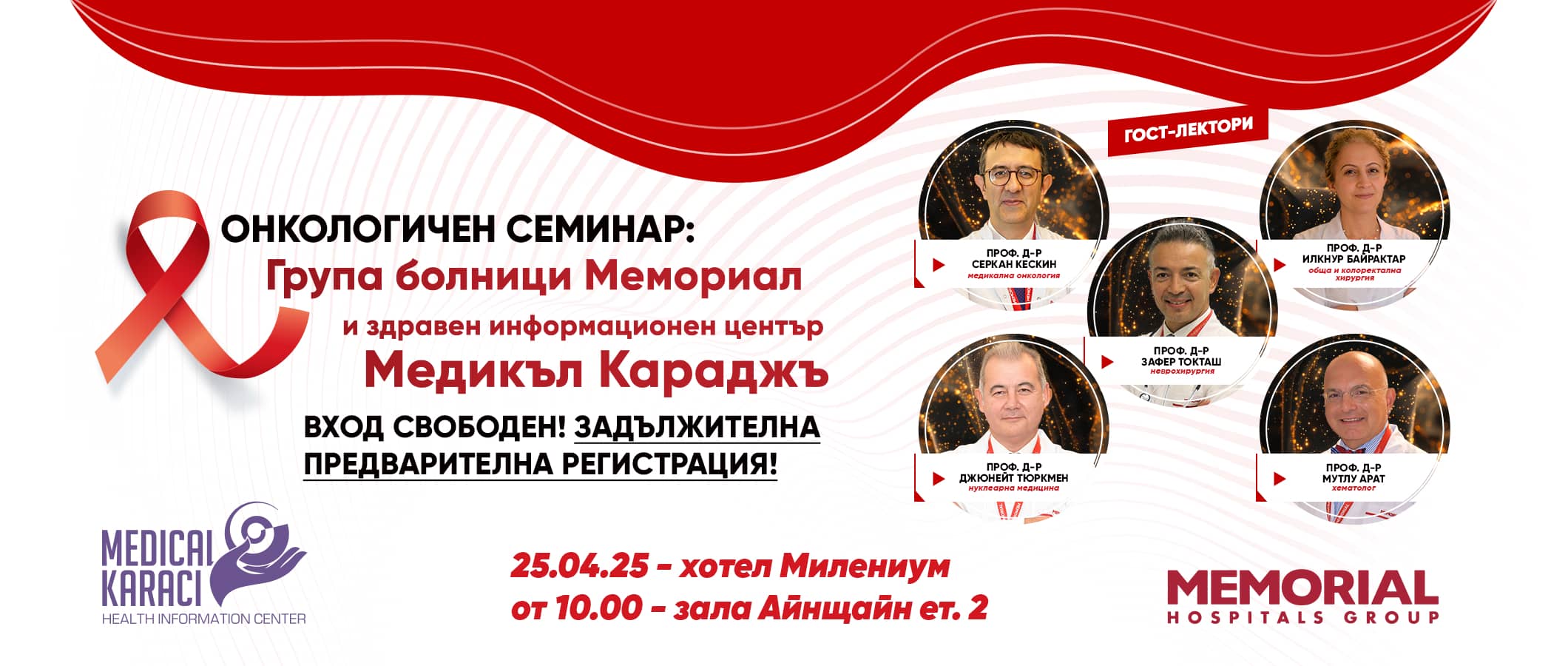Colon cancer is the second most common cancer in men, after lung cancer, and the second most common cancer in women, after breast cancer. In Bulgaria, the incidence of colon cancer has doubled in the last 20 years. The disease affects one in 28 per 100 000 people in the population.
What is colon cancer?
Colon cancer or colorectal cancer affects the rectum (the end part of the colon) or colon. Colorectal cancer is among the leading causes of death.
What causes the development of colon cancer?
Most colorectal cancers are due to old age and lifestyle factors, with only a small number of cases due to genetic diseases. Risk factors include diet, obesity, smoking and lack of physical activity. Another risk factor is inflammatory bowel disease, which includes Crohn's disease and ulcerative colitis. Some of the inherited genetic diseases that can cause colorectal cancer include familial adenomatous polyposis and hereditary nonpolyposis colon cancer- however, these account for less than 5% of cases.
How does colon cancer develop and what are the first symptoms?
Usually the disease starts as a benign tumor, often in the form of a polyp, which over time becomes cancerous. Unfortunately, colon cancer has no early symptoms. Often complaints appear at a late stage, when the chance of successful treatment is quite low. In the beginning, the complaints are non-specific - bloating, malaise, pain. A change in the usual bowel habits especially in patients after 50 years of age, and blood or mucus in the stool should always direct patients to seek specialist consultation. Weight loss and easy fatigue are often seen.
In blood tests, changes are very rarely reported. Decreased haemoglobin values may be emphasised as a result, which should be followed up to find out the cause and whether it is colon related. Tumour markers are not routinely used for screening and diagnosis of disease as they may be normal despite the presence of an advanced oncological process in the colon.
How is colon cancer diagnosed?
After the patient has visited a specialist gastroenterologist and explained his complaints, it is the doctor who must decide what further studies are needed. Risk group, severity of complaints, age are taken into account and laboratory and imaging results are carefully interpreted. Colonoscopy is the gold standard for colon cancer screening and diagnosis. During colonoscopy, the colon and terminal part of the small intestine are carefully examined for pathological changes, any polyps found are removed and sent for histological analysis. Removal of polyps can prevent cancer formation. In patients with contraindications to colonoscopy, irrigography, a double contrast study with barium slurry, may be performed. Fecal DNA test - this test analyzes DNA material from a fecal sample to detect cancer. The test detects DNA material contained in polyps and cancerous growths to determine if a colonoscopy is needed.
How is colon cancer treated?
Diagnosis is followed by the equally important process of staging the disease, which is done by imaging - scanner, PET scanner and/or nuclear magnetic resonance. These help us to understand the extent to which the disease has progressed, whether it has involved lymph nodes or other organs, or whether it is confined to the wall of the colon. This information is very valuable because we can then assess what the subsequent management should be. It is of the utmost importance that the decision to treat the cancer is made by an expert committee, which includes doctors from different specialties: a medical oncologist, a gastroenterologist, a pathologist, an imaging specialist, a surgeon and a radiotherapist. Each patient is considered individually, according to the location of his disease, its stage, comorbidities and the expected therapeutic response.
The approach to each patient must be individual according to his specific condition, the patient's expectations and the possibilities of medicine. Not all patients should be approached with surgery as the first method of treatment. Some patients are suitable for chemotherapy or radiotherapy prior to surgery, others proceed directly to surgery. An individualized approach to treatment is essential to achieve optimal results, maximum duration and good quality of life.
Can we prevent colorectal cancer and when is it appropriate to start screening for this disease?
Regular colonoscopy after the age of 50 is the best way to reduce the risk of colon cancer. We know that patients are afraid of this type of diagnostic method because they think they will experience pain and discomfort, but what I can say is that colonoscopy is a completely safe method. It is performed under anaesthesia and the patient does not feel any pain. The examination itself lasts about 25 minutes, and good preparation of the colon is essential to minimize unexamined areas of the bowel. Often the 25 minutes that the patient has taken for prophylaxis could have prevented the development of a serious cancer. On our website www.medikara.bg you can find special offers and check up packages on colon cancer screening options.
To reduce the risk of the disease help:
- lifestyle change
- maintaining a healthy body weight
- the healthy diet
- avoid red meat and alcohol
- smoking cessation
- increased physical activity
What should patients interested in colon cancer treatment abroad do?
"Medical Carragee offers colon cancer patients the most advanced and innovative treatment at some of the best cancer centers in the world. All patients who come to us receive a free consultation with some of the best specialists in colorectal cancer treatment. This way they can find out if they are on the right track in their treatment or if there are other more effective and advanced treatment methods. For us, an informed patient is the best patient because they have already gone at least 10 % of their healing journey...









